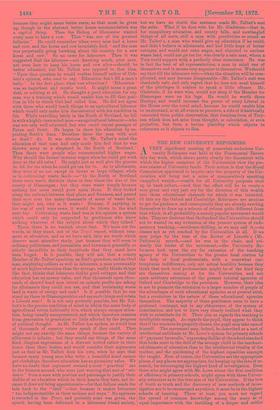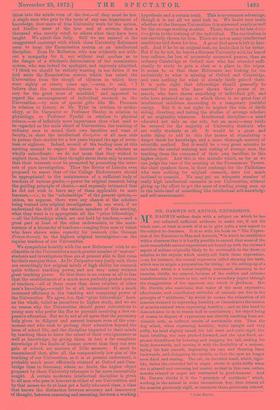THE NEW UNIVERSITY REFORMERS.
AVERY significant meeting of somewhat audacious Uni- versity Reformers was held at the Freemasons' Tavern this day week, which shows pretty clearly the discontent with which the higher members of the Universities view the pre- sent misuse of University funds. Their notion is that the Royal Commission appointed to inquire into the property of the Uni- versities will bring out a mine of comparatively speaking unapplied wealth,—wealth for all University purposes shut up in bank cellars,—and that the effect will be to create a very great and very just cry for the direction of this wealth into those educational channels for which it was intended. Of this cry the Oxford and Cambridge Reformers are anxious to get the guidance, and consequently they are already exerting themselves to draw up a scheme of reform quite different from that which, in all probability, a merely popular movement would take. They are desirous that the funds of the Universities should not be wasted on any extension of the present system of rudi- mentary teaching,—accidence-drilling, as we may call it,—to classes not as yet reached by the Universities at all. If we may judge by the tone of the Rector of Lincoln's (Mr. Pattison's) speech,—and he was in the chair, and evi- dently the leader of the movement,—the University Re- formers look upon the cry for extension of the teaching agency of the Universities to the greater local centres by the help of local professoriate, with a somewhat con- temptuous indifference, only not actual hostility because they think that such local professoriats might be of the kind they are themselves aiming at for the Universities, and not mere arbitrary extensions of the present tutorial agencies of Oxford and Cambridge to the provinces. However, their idea is not to promote the extension to a larger number of people of the advantages of such educational agencies as at present exist, but a revolution in the nature of these educational agencies themselves. The majority of these gentlemen seem to have a profound contempt, not to say abhorrence, of the system of examination, and not to have very clearly realised what they wish to substitute for it. Their aim as regards the teaching is intelligible enough. As regards the pupil, they appear to think that if the teachers be properly chosen, the pupil may take care of himself. The movement may, indeed, be described as a sort of intellectual antithesis to Mr. Lowe's system for primary schools of "payment by results," expressingdislike of the school standard that looks more to the drill of the average child in the mechani- cal elements of education than to the intellectual vitality of the teacher, and the quickening of the highest capacities amongst the taught. Now, of course, the Universities are the appropriate places, if any places are appropriate, for keeping up the love of re- search, for encouraging the highest kind of investigation. Even those who might agree with Mr. Lowe about the first condition of efficiency in primary schools, might agree with these Univer- sity reformers as to the true aim of the Universities. If the love of truth as truth and the discovery of new methods of inves- tigation are to be encouraged anywhere, it must be in the highest schools of learning. There at least, you must not regard the spread of common knowledge among the many as of equal importance with the instilling of a deeper and nobler thirst into the minds even of the few,—if they must be few. A single man who gets to the roots of any one department of knowledge, does more of true University work for the nation, and kindles more of the true zeal of science, than a thousand who merely retail to others what they have been taught. We admit this fully. Still we are amazed at the exaggerated contempt with which these University Reformers seem to treat the Examination system as an intellectual discipline. Even Dr. Rolleston, who was evidently not with- out a sympathy for it, not without real qualms as to the danger of a wholesale denunciation of the examination system, who was indeed its apologist, and expressly admitted, "I think we should be entirely wanting in our duties if we laid aside the Examination system which has raised the Universities from the slough of idleness in which they were eighty or ninety years ago,"—even lie said, " I believe that the examination system is entirely unneces- sary for the great mass of mankind," and appeared to regard the encouragement of individual research in the Universities,—by men of special gifts like Mr. Freeman in relation to history, or Mr. Tyler in relation to arch2e- ology, or Dr. Carpenter or Professor Huxley in relation to physiology, or Professor Tyndal in relation to physical science,—as of infinitely more importance than what used to be regarded as the main object of Universities, the training of ordinary men to sound their own faculties and want of faculty, in short the intellectual discipline of all men able to pursue their studies for a few years beyond the age of seven- teen or eighteen. Indeed, several of the leading men at this meeting seemed to regard the interest of the scholars as wholly subordinate ; we do not mean that they wished to neglect them, but that they thought about them only to assume that their interests must be promoted by promoting the inter- ests of pure investigation. Thus the Rector of Lincoln even proposed to assert that all the College Endowments should be appropriated to the maintenance of a sufficient body of teachers of various grades,—power for original research being the guiding principle of choice,—and expressly intimated that he did not wish to leave any of them applicable to mere learners,—i.e., to the "scholarships" of the present system,— unless, we suppose, there were any chance of the scholars being trained into original investigators. In one word, if we understand the drift of the various speakers of this meeting, what they want is to appropriate all the "prize fellowships," —all the fellowships which are not held by teachers,—and a great part at least of the other endowments, to the main- tenance of a hierarchy of teachers—ranging from men of talent who have shown some capacity for research (the German Privat-docent), to the highest original investigator—as the regular teachers of our Universities.
We sympathise heartily with the new Reformers' wish to ac- climatise in the Universities a much greater number of "mature" students and investigators than are at present able to find room for their energies there. As Dr. Carpenter very justly said, there are exceedingly few original minds of high ability for research quite without teaching power, and not very many without great teaching power. So that there is no reason at all to fear that the establishment of a much more perfectly graded system of teachers,—all of them more than mere retailers of other men's knowledge,—would be at all inconsistent with a much increased efficiency in the teaching and examining power of the Universities. We agree, too, that "prize fellowships" have, on the whole, failed as incentives to higher study, and we see no reason why the Universities should grant subventions to young men who prefer the Bar to pursuits involving a less ex- pensive education. But we do not at all agree that the pecuniary help given to diligent and earnest learners even of the com- monest sort who wish to prolong their education beyond the term of school life, and the discipline imparted to their minds by teaching them to know the extent of their own ignorance as well as knowledge, by giving them, in fact, a far completer knowledge of the limits of human powers than they can ever gain at school, are matters of little moment. It must be remembered that, after all, the comparatively low aim of the teaching of our Universities, as it is at present understood, is probably much more efficiently attained at Oxford and Cam- bridge than in Germany, where, no doubt, the higher object proposed by these University reformers is far more successfully sought. A certain moderate intellectual discipline is given to all men who pass in honours at either of our Universities, and by that means we do at least get a fairly educated class, a class that knows the distinction between accuracy and inaccuracy of thought, between reasoning and assuming, between a working
hypothesis and a certain truth. This is no common advantage, though it is not all we need look to. We doubt very much whether at the German Universities it is answered nearly as well for the average working student. There, there is far less direc- tion given to the training of the individual. The curriculum is not carefully chosen for him. There are not so many intellectual conditions laid down for him. A great deal more is left to him- self. And if he be an original man, no doubt that is far better. But if he be not, he leaves a German University with far less of true culture, far less of accurately measured powers, than an ordinary Cambridge or Oxford man who has attended suffi- ciently to study to gain a class or a place in the tripes. It seems to us that these Reformers are looking far too exclusively to what is missing at Oxford and Cambridge, and care nothing for what is already fairly gained there. It is quite right that fellowships should generally be reserved for men who have shown their power of re- search, who have shown something of individual gift, and who have attained an age at which there is no great fear of intellectual indolence succeeding to a temporary youthful energy. But it is not right to neglect the aim of fairly aiding, directing, and testing the studies of average scholars of no originality whatever. Intellectual discipline—a mind educated not only on one side, but on many—may fairly be secured for the majority of University students who
are really students at all. It would be a great and noble thing to add to this the means of stimulating a deeper thirst for knowledge, and a more thorough mastery of scientific method. But it would be a very great mistake to sacrifice the careful training and testing of average men, the teaching them the command of their own faculties, to this higher object. And this is the mistake which, as far as we can judge the tone of the meeting at the Freemasons' Tavern, the chief speakers there, in their Contempt for the Philistines who care nothing for original research, were too much inclined to commit. We may get an adequate number of really high intellectual summits in our Universities, without giving up the effort to get the mass of reading young men up to the table-land of something like intellectual self-knowledge and self-measurement.



































 Previous page
Previous page